North Carolina War Between the States Sesquicentennial
"The Myth of the Lost Cause"
or
"The Myth of Saving the Union?"
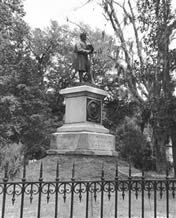
“A serious investigation might look into why the North (and the rest of the world) has had such
a voracious appetite for “Lost Cause mythology.” Is it possible that the myth owes much of its
creation and force to Northern psychological needs instead of being just a Southern deception?”
Dr. Clyde N. Wilson
Origin of the Term "The Lost Cause"
In 1866 editor Edward A. Pollard published his book, The Lost Cause,” as a factual and well-documented
explanation of the South’s reasons for withdrawing from the Founders’ Union, stating in his forward that:
“the author aspires to place the history of the War above political misrepresentations, to draw it from
disguises and concealments, and to make it complete in three departments:
the records of facts; the accounts of public opinion existing with them; and the lessons their context
should convey or inspire. These are the three just elements of History.”
The “Lost Cause” Pollard described was the cause of the American South to peacefully withdraw from
the Founder’s Union in the spirit of Thomas Jefferson’s Declaration of Independence; that “Governments
are instituted among men, deriving their just Powers from the Consent of the Governed, that whenever
any Form of Government becomes destructive of these Ends, it is the Right of the People to alter or
abolish it, and to institute a new Government…in such form as to them shall seem most likely to
effect their Safety and Happiness.”
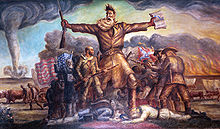
Author Charles W. Ramsdell wrote in 1964 of the South’s viewpoint in 1860:
“In the South the explanation was simple….Northern manufacturers and capitalists had joined
with fanatical abolitionists to overthrow the constitutional rights of the Southern States, the one
in order to subject Southern agriculture to heavy burdens for the promotion of Northern wealth,
the other to break down the beneficent Southern social-racial system [and] inaugurating a war of the races….
The Southern States, exercising their sovereign rights, had withdrawn from fellowship with the free
States in order to protect their people from destruction by a hostile sectional majority. For them it was
a war of defense against wicked aggression and threatened subjugation.”
(Ramsdell, The Pursuit of Southern History, LSU Press, 1964, page 24)
Among the first to add to Pollard’s account was General Jubal Early’s memoirs, though Northern
politicians and former military men were quickly penning volumes that underscored the glorious moral
victories they believed they had wrought for mankind. Despite the moralistic tone of Northern writers,
the South saw the North’s triumph as a Pyrrhic victory in which both North and South had lost
political self-determination and witnessed the end of the American republic. The North needed
to justify the magnitude of the war’s human and financial cost.
"The Myth of Saving the Union”
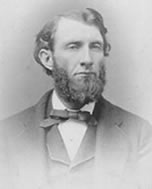
[T]he history of the United States should be written by a Northerner and “from the Northern point
of view….because the Northern point of view is, in the main, the correct view,” and that, while sincerity
must be allowed the Southern people and their leaders, “not one scintilla of justification for secession
and rebellion must be expected. The South must acknowledge its error as well as its defeat.”
John W. Burgess, Dean of the Faculty of Political Science, Columbia University, 1897.
(Ramsdell, The Pursuit of Southern History)
Manufacturing the Northern Myth
“In the middle [eighteen-]eighties two prominent Republicans, James G. Blaine and John A. Logan,
gave to the public political memoirs which, while adding nothing of importance to the national dialectics,
were widely read and served to strengthen the familiar tenets of their party and section.
Meanwhile, no less effective work in the formulation of [Northern superiority] was being done by thousands
of men of lesser prominence – editors, politicians, preachers, teachers, and platform lecturers. In the
North the “Union-savers” and the abolitionists had joined forces early in the war. The abolitionists,
strong in the churches, had been able to add religious and moral sanctions to the cause of unionism,
thereby adding immeasurably to the popularity of their interpretation of the conflict.
In fixing war guilt upon the secessionists and especially upon the “slaveholding aristocracy,” the
conviction that religion and morality were on the side of the victors induced a pleasing sense
of righteousness; while the evidence that through God’s will the nation most favored Him of all
this modern world had been preserved in its territorial integrity, and the most conspicuous
outpost of Satan’s dominion had been eliminated from America, was a crowning satisfaction.
The Northeast enjoyed especially enjoyed an amazing prosperity during the early postwar years,
and eager business men, having quickly learned how useful government could be to business,
looked back to the war as the beginning of a better and brighter day. Thousands of others, who had
shared neither in the righteous exaltation nor in the new profits,
settled down into the opinions of their neighbors.
As society adjusts to revolutionary change and proceeds to build or extend its institutional edifice
upon the new plan, it displays an irresistible impulse to accept and justify the established order.
Success justifies itself; in the long run the victor is always right.
Again, the literary dominance of New England, where for years most of the histories were written,
enabled “the New England point of view” to permeate the thinking of the greater part of the country.
Northern textbooks in use throughout the nation fixed ever more firmly in the popular mind the
nationalist and antislavery interpretation of the causes and character of the war.”
(Charles W. Ramsdell, The Pursuit of Southern History, pp. 25-26)
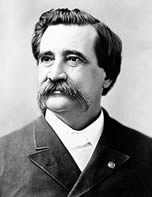
John A. Logan
The North Uncovers Diabolical Southern Plot:
“In the late nineteenth century, before pioneering Southern historians exerted great influence,
a pro-Northern explanation of the coming of the war had gained rather general acceptance,
thus seemingly confirming Jefferson Davis’s fears that this
might become the South’s greatest war loss.
Historians at the same time had also moved away from the emotion-packed interpretations of the
coming of the war earlier set forth by Northern writers such as Henry Wilson, John A. Logan, and
Herman von Holst. According to them, there had been wickedness only South of Mason and Dixon’s line.
Southern leaders had been guilty of a diabolical plot to destroy a sacred union which they could no
longer selfishly control, for the purpose of perpetuating and extending the hideous institution of slavery.
Against an aggressive Southern “slavocracy,” a nobly motivated Northern people had defended
national morality, democracy, and liberty. To the South was assigned a villain’s role in the successive
events of the 1846-61 era. The annexation of Texas was a dark Southern conspiracy. The Mexican
War was a war of aggression to seize away from a weak neighbor some or all of its territory for
expansion of slavery and continued Southern control of the federal government.
In such unholy activities the South prostituted the Democratic party in its purposes and received support
from such sycophantic Presidents as Franklin Pierce and James Buchanan. Southern slaveowners were
evil men lacking even the rudiments of Christian morality, while Northern abolitionists and the
Republican party were as pure as the driven snow.”
(C.E. Cauthen, The Coming of the Civil War, Writing Southern History, Link & Patrick, editors, LSU Press, pp. 226-227)

George Julian
The North the Absolute Dictator of the Republic:
“[But] there were persons in Congress and out who would not believe the war had come to an
end until those who had caused it were adequately punished, the Negro set on the road to
first-class citizenship, and the Republican party assured of political dominance.
As early as May 5, 1865, The Independent, which spoke for what came to be called the
radical Republicans in Congress, was asserting:
“There is one, and only one, sure and safe policy for the immediate future, namely: The North must
remain the absolute Dictator of the Republic until the spirit of the North shall become the spirit
of the whole country…the South is still unpurged of her treason. Prostrate in the dust she is no less a
traitor at this hour than when her head was erect. They cannot be trusted with authority over their
former slaves; they cannot be trusted with authority over the re-cemented Republic…The only hope for
the South is to give the ballot to the Negro and in denying it to the rebels.”
In like spirit George W. Julian of Indiana would “indict, convict and hang Jefferson Davis in the name
of God; as for Robert E. Lee, unmolested in Virginia, hang him too. And stop there? Not at all. I would
hang liberally while I had my hand in.” Senator Benjamin Wade of Ohio suggested that “if the Negroes by
insurrection could contrive to slay one-half of the Southern whites, the remaining half would then hold
them in respect and treat them with justice.” Charles Sumner would seize all rebel property and
distribute it to the Negroes, give them the vote, and let them rule the section.
The war would not be over until the Southern people were “repentant” to the point of accepting
intellectual, social and economic changes, perhaps even a political rearrangement.
Why did Congress now insist on taking a hand in control [of Reconstruction]? The object,
of course, was to give the legislature under Republican dominance the power to do with the
South what the victor in the war thought should be done.
[Thus], the future of Republican rule was assured.
(Reconstruction, Avery O. Craven, pp 93-133)
The Jacobin Machine:
“[Massachusetts Senator Charles] Sumner [stated that ] Lincoln would not only proclaim a strong emancipation
policy, but that he had agreed to raise a Negro army of 200,000, to hold the Mississippi basin. The pressure
of the [Republican] Jacobins upon Lincoln during the last week of December [1962] was terrific. The radical
machine threatened to defeat all appropriations for war supplies if the president did not publish his
[emancipation] edict. Lincoln was quoted as saying that he would have been superseded by a dictator
had he refused to proclaim emancipation.”
(Lincoln and the Radicals, T. Harry Williams, page 215)
The South Governed as Conquered Provinces:
“Upon what terms were the defeated Southern States to be returned to the Union?
The Jacobins had moved far beyond their position as announced in the Wade-Davis bill. No longer
were they content to accept emancipation as the great result of the war. Now they demanded as the
price of readmission a program which would ensure Republican control of the South.
They had no mind to see unrepentant Southern Democrats returning to Congress and in alliance
with their Northern [Democrat] fellows destroying the economic measures passed by the Republicans
during the war: the protective tariff, the national banking system, and the homestead bill. They
demanded the suffrage for the freed slaves and the disenfranchisement of a substantial portion
of the Southern white population.
Some of them, like [Thaddeus] Stevens, advocated the distribution of confiscated rebel property
among former slaves. They demanded that until their policies became a reality the seceded States
be governed by the military as “conquered provinces.”
(Lincoln and the Radicals, T. Harry Williams, pp. 356-357)
Fraudulent Election Mandates:
“The Jacobins faced the fall [1864] elections with a swaggering confidence and a determination to wipe
out the losses of the previous year when the Democrats came perilously close to gaining control of Congress.
But the most potent force working for Republican victory was [Secretary of War Edwin] Stanton….
who dashed off letters [to party leaders] offering to furlough home enough soldiers to swing the
elections. The solider votes which Stanton poured into the ballot boxes carried the day in many
States, notably Pennsylvania, where Curtin held on to the governorship my a narrow margin.
“This State has really been carried by fraud,” one Republican admitted to Sherman, “but we have
control of the State which is very important.” Another said Curtin would have been defeated “if it had
not been for the soldier [vote].”
The Jacobin press cried that the election returns were a mandate to the administration from the North
to advance further and faster in the direction of radicalism and the New Jerusalem….”The elections
were an indorsement of the government’s…aggressive, not its conservative zeal, and of its iron hand,
not of its silk glove method with the rebellion.”
(Lincoln and the Radicals, T. Harry Williams, pp. 292-294)
The Radical’s New South:
"Radical propaganda had educated the masses to accept emancipation and Negro soldiers.
The radicals had a design for the New South already worked out. Some of the details were lacking
but the main outline was starkly clear.
The demanded conditions for readmission which would insure Republican domination of the Southern
political system and give the deathblow to the power of the slaveholding aristocracy. [Forcing Negro
suffrage upon the South] was the surest way of establishing Republican control in Dixie, but they
realized large doses of propaganda would have to be administered before they could educate the
public to support this position."
(Lincoln and the Radicals, T. Harry Williams, pp. 294-295)
The South as Mere Provinces:
“In the 37th Congress [Thaddeus Stevens [of Pennsylvania] became almost a despot.
He did not lead men – he drove them, with stinging word and harsh rebuke,
and with wit which cut like the lash of a whip.
"In the first year of the war, [Thaddeus] Stevens worked out his theory of the status of the
Southern States, and thereafter continually propounded it with brutal frankness. He scoffed
at [Charles] Sumner’s cobweb spinning; no “State suicide” for him. The Southern States
had seceded; they were no longer in the Union and were no longer American States.
Therefore they had no color of title to any of the rights of States.
They were foreign powers; when occupied by Federal troops, they were merely conquered
provinces, and as such the United States could deal with them as is saw fit. The Southerners’
property could and should be confiscated. They were merely territories which might or
might not be admitted into the Union, as Congress might prescribe.”
(The Age of Hate, George Fort Milton, page 263)
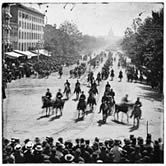
Review of the Napoleonic Grand Army in Washington:
“[In] the American experience up to 1865, nothing like the Grand Review [of Northern armies in
Washington] had been seen. The sheer size of the armies was new, as was their concentration
in a single city. Had all the men under arms at the close of previous American wars been
gathered in one place for a parade, the assembled host would have been smaller than the one
brought together at Washington, a force that itself only represented about 10 percent of the
federal troops engaged for some period in the fighting.
Lacking an American precedent, newspaper editors resorted to comparing the review to those
of Napoleon’s armies or those of the Russian troops in Paris in 1814. Colonel Stephen Minot
Weld, marching with the Fifty-sixth Massachusetts Volunteers, found the scene “splendid.
It really seemed as if the statue of the Goddess of Liberty were alive and looking
down on us with triumph and pleasure.”
(Glorious Contentment, Stuart McConnell, pp. 3-4)
Mythical and Actual Origin of the Grand Army of the Republic:
“The legendary version of the founding of the Grand Army of the Republic [GAR, organization of
Northern veterans after the war] goes something like this: In 1866 a gentle former Union Army
surgeon, Dr. Benjamin Franklin Stephenson, and several of his former comrades were pining for the
camaraderie of camp. Envisioning a broad brotherhood of veterans [it was to be] suffused with
brotherly love and dedicated to the relief of fellow veterans.
The real story is more complicated, and much more interesting. [Stephenson] undoubtedly
envisioned his new veterans’ group as a tool to further the political ambitions of two Illinois
Republicans, General John A. Logan and Governor Richard Oglesby. These two men, firmly on the
Radical side of the gathering storm over Reconstruction policy, were the political movers behind
an organization which Stephenson’s professions of benevolence and charity lent a nonpolitical veneer.
[The] new order worked effectively for the Grant-Colfax [presidential] ticket during the campaign of 1868.
To soldier-politicians like Logan, Oglesby, and [ambitious Republican politico] Norton P. Chipman….
the GAR was a voting machine, which they fondly hoped to ride to political prominence. What such
[a voting machine] army could accomplish when properly drilled was already apparent to these
political officers from their experience in marshalling the massive “soldier vote”
for Lincoln in 1864 and Grant in 1868.”
(Glorious Contentment, Stuart McConnell, pp. 24-25)
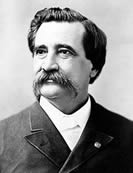
GAR Political Power and Negro Suffrage:
“The election of 1866 showcased the GAR’s political power. Their organization was impressive,
sponsoring reunions and picnics for the war veterans, complete with entertainment soldiers’ loved –
band music, good food, and Radical oratory.
[Former Northern General John A.] Logan spoke out loud and clear against the former
Confederate States, conquered entities subject to the necessary oversight and restrictions
imposed by the U.S. Army and Congress. Logan vented as only he could against the rebellion,
proclaiming that he would have executed Jefferson Davis…had he captured him at the end of the War.
Logan’s position on the rights of blacks was hardly a popular one in the States comprising the old
Northwest Territory, including Ohio. The Negro Suffrage amendment lost [in Ohio] by nearly 40,000 votes
[and] proved more than anything that Logan’s unpopular [Radical] position on civil rights was an
altruistic one that he knew were a political liability, not only in Ohio but also
in Illinois where overt racism prevailed.”
(Black Jack Logan, Gary Ecelbarger, pp. 243, 245, 247)
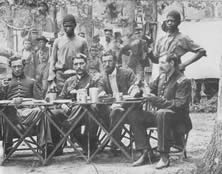
No Black Veterans in the Army of Emancipation Grand Review:
“More surprising [in the Washington Grand Review of the federal armies] was the exclusion
from the parade of the black Union regiments, some of which had fought a good deal longer than
the white units on parade. A number of observers commented on their absence, the Inquirer
concluding that “by some process it was arranged that none should be here….
They can afford to wait. Their time will yet come.”
The few blacks in the review marched as parts of “pick and shovel” brigades or were included
as comic relief. Two large black soldiers with Sherman’s army, for example, were displayed
“riding on very small mules, their feet nearly touching the ground.”
Captured slaves were described as “odd looking “contrabands” dressed in all the colors that ever
adorned Joseph’s coat.” In the rear of the First Pennsylvania, one such captive, mounted on a
solitary Confederate mule, “created much laughter, in which the President and others
joined heartily” as he was carried past the reviewing stand.
Neither the free black nor the free black soldier was to be the hero of this national pageant; instead,
each was relegated a secondary, rather uneasy position within it. The exclusion of blacks from the
celebration was a clear message about the sort of Union the white [Northern] veterans felt they had preserved.”
(Glorious Contentment, Stuart McConnell, pp. 8-9)
The National Union Republican Party of 1868:
In no way did the radical Republican party recognize the principles of that Declaration,
and it did all in its power to destroy the republic of the Founders.
Had there been no Republican party, the Union would indeed have been saved, peaceful Christian
charity and time would have ended slavery, equality under the law would have reigned as provided
in the United States Constitution, and no Northern citizens and editors would have been imprisoned
in American bastilles for opposing Jacobin hegemony.
“Smiler” Colfax (below) would be brought down by the Credit Mobilier scandals which bribed
high government officials with cash and stocks; he was replaced as
vice president in 1872 with the equally-corrupt Henry Wilson.
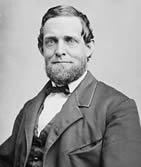
“Saving the Union” Mythology
Letter of acceptance of the vice-presidential nomination, National Union Republican party, 29 May, 1868:
“The debt of gratitude [my acceptance] acknowledges to the brave men who saved the
Union from destruction, the frank approval of amnesty based on repentance and loyalty, the demand
for the most thorough economy and honesty in government, the sympathy of the party of liberty
with all throughout the world who long for the liberty we here enjoy, and the recognition of
the principles of the Declaration of Independence, are worthy of the [Republican party] on whose
banners they are to be written in the coming contest.
Its past record cannot be blotted out or forgotten. If there had been no Republican party,
Slavery would to-day cast its baneful shadow over the Republic. If there had been no Republican party,
the free press and free speech would be unknown from the Potomac to the Rio Grande as ten years ago.
If the Republican party could have been stricken from existence when the banner of rebellion
was unfurled, and when the response of “no coercion” was heard in the North, we would have no nation to-day.
But for the Republican party daring to risk the odium of tax and draft laws our flag could not be
kept flying on the field until the long-hoped for victory came. Without the Republican party
the Civil Rights bill – the guarantee of equality under the law to the humble and the defenceless,
as well as to the strong – would not be to-day upon our national statute book.
With such inspiration from the past, the example of the founders of the Republic, who called
the victorious General of the Republic to preside over the land his triumphs had saved from
its enemies, I cannot doubt that our labors with be crowned with success.”
Very truly yours, Schuyler Colfax”
(The Republican Party, 1854-1904, Francis Curtis, G.P. Putnam’s Sons, 1904, page 507)
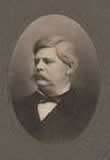
North Carolina Senator Zebulon Vance on Republican Party Purity:
“[It was the Republican party] which inaugurated Reconstruction. By Reconstruction, it will be
remembered one-fifth of the votes in eleven States was suppressed by law. The punishment of
disfranchisement was freely inflicted as a punishment for crime without trial and conviction.
Thousands upon top of thousands of other votes were suppressed by fraud, the returns being counted
and canvassed in secret by men not sworn or in any way responsible to anybody, acting in States
far distant from the places where the votes were cast. In addition to this there were received and
counted the ballots of those who were not entitled to suffrage under any
law known to American history or tradition.
In this way eleven Southern States were subjected to the control of this fountain of purity. The Republican
party took full charge of them and their destinies. Behind and in support of their leaders stood the Army
of the United States and all the moral power of the government then under the control of this great
party whose chief desire is the purity and freedom of elections.
The carnival of corruption and fraud, the trampling down of decency, the rioting in the overthrow
of the traditions of a proud people, the chaos of hell on earth which took place beggars the descriptive
powers of plain history.…I believe a committee of Congress, who took some testimony on this
subject, estimated in 1871 the amount of plunder which was extracted from the Southern
people in about 5 short years---some $300 millions of dollars in the shape of increased
debt alone, to say nothing of the indirect damage inflicted by the many ways of corruption
and misrule which cannot be estimated in money.
The trick by which Republicans fastened itself for a term of years upon the downtrodden States
was one which could only have been originated with a party devoted to the highest morality and
the purest elections. Grants of the public domain equal to the area of many great nations were
jobbed away to companies of loyal speculators.
The Credit Mobilier was born and with incredible rapidity became the scandal of Christendom. Whiskey
rings fastened their thievish grip upon the revenues. The Black Friday conspiracy shook the credit
of the continent and made businessmen lose faith in human integrity.
As soon as there began to appear any necessity for it, that is to say, so soon as there appeared
a feeble and languid rallying of political virtue in the dazed public mind, this pure and virtuous
party began to provide against the reaction with a system of gerrymander. New York,
New Jersey, Connecticut, Ohio and various other States were so arranged in their
Congressional and legislative districts as to completely drown
the will of the majority and suppress their votes.
It is not an exaggeration to say that the dominant majority in both Houses of this Congress is the
legitimate result of this suppression of the popular will by the methods of gerrymandering,
aided and supplemented by a skillful application of the “fat” fried out of the tariff beneficiaries
and used for the purposes of floating voters in blocks of five, by the very party leader who
here says that the (Force) bill is intended to defend the Constitution of the United States
against those who…are in the habit of substituting “processes of fraud,
intimidation and bribery” (for honest elections).
The material and moral ruin wrought under this infernal conjunction of ignorance and intelligent
vice was far greater than that inflicted by war. The very foundations of public virtue were undermined,
and the seeds of hatred were thickly sown between the races.
You upheld the party the party of misrule and ignorance in every way you could. You kept the
Army of the United States in the South….as long as you dared. You sorrowed when the plundering
of our people was stopped, and you received to your arms as martyrs the carpetbag fugitives
expelled by the indignation of an outraged people.
(Excerpts of Speech by Senator Zebulon B. Vance of North Carolina in the Senate
of the United States, December 15, 1890 regarding the Federal Election “Force Bill.”
The South at the Bar of History
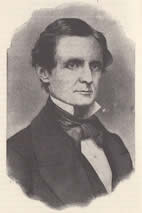
No Forced and Fruitless Union:
Speech in Congress of Senator Jefferson Davis of Mississippi, Dec. 10, 1860
“Our fathers, learning wisdom from the experiments of Rome and Greece – the one a consolidated
republic and the other strictly a confederacy – and taught by the lessons of our own experiment under
the [Articles of] Confederation, came together to form a Constitution for “a more perfect union,” and,
in my judgment, made the best government which has ever been instituted by man.
It only requires that it be carried out in the spirit in which it was made, and the circumstances under
which it was made should continue, and no evil can arise under this Government for which it has not
an appropriate remedy. Where, then, is [the evil]?
It is that our fathers formed a Government for a Union of friendly States; and though under it the people
have been prosperous beyond comparison with any other whose career is recorded in the history
of man, still that Union of friendly States has changed its character, and sectional hostility has been
substituted for the fraternity in which the Government was founded.
[And] thus the Government [is] rendered powerless for the ends for which it was instituted. The hearts of
a portion of the people of a portion of the people have been perverted by that hostility, so that the powers
delegated by the compact of union are regarded not as a means to secure the welfare of all, but as
instruments for the destruction of a part – the minority section.
How, then have we to provide a remedy? By strengthening the Government? By instituting physical force
to overawe the States, to coerce the people under them as members of sovereign communities to pass
under the yoke of the Federal Government?
No, sir; I would rather have this Union severed into thirty-three fragments sooner than have that great evil
befall constitutional liberty and representative government. Its founders did not look to its preservation
by force….The remedy for these evils is to be found in the patriotism and the affection of the people,
if it exists; it is far better, instead of attempting to preserve a forced and therefore fruitless Union,
that we should peacefully part and each pursue a separate course.”
(Rise and Fall of the Confederate Government, pp. 62-63)
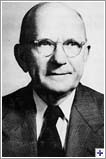
Historian E. Merton Coulter
“The North, having won the war on the battlefield, immediately set out to win it again and consolidate
victory on the printed page. A flood of books appeared, and the South took umbrage at most of them.
A new invasion was on, and the South must meet words with words – but words based on historical facts.
Said Edward A. Pollard in 1866, “all persons in the South who assist in getting the true testimony of their
unfortunate struggle, perform a last, but most important office of faithful love, and do a noble work in
rescuing the name of a lost cause from the slanders of those who, having been our accusers and
executioners in this present time, would also be our judges at the Bar of History.”
And ten years later R. Randolph Stevenson was saying, “The Southern actors in the great struggle would
be recreant to the duty which they owe to their posterity, were they to permit the false allegations
of the Northern historians to be accepted as true without attempting a refutation and vindication.”
History now took on for Southerners a more practical character than had ever appeared before in all the
annals of the South. It was the last stronghold of the South not for the defense of its nationality, but for
the protection of something more dear and sacred, its reputation.
Defeated on the battlefields, it was again suffering in Reconstruction the defeat of its reasonable
expectations of an honorable peace. With Jefferson Davis destined never to be tried, and the Reconstruction
Acts withheld from the judges, it was denied the right of that vindication in the courts which
it had reason to expect.
For years unrepresented in the halls of Congress, and then misrepresented there by Scalawags and Carpetbaggers,
the South had only one tribunal left – the bar of history.
As Benjamin H. Hill said: “Thus, denied by our enemies the opportunity of silencing, by the solemn
judgments of their own courts, the fierce accusations of criminality in secession; and denied, by our
enemies and the follies of our own people, the glorious chance of vindicating our cause in high debate,
and face to face with the chosen champions of our accusers, we have but one resource left us for
our defense or vindication. That resource is history – impartial, and unpassioned, un-office-seeking history.”
And further, “We owe it, therefore, to our dead, to our living, and to our children, to be active in the work
of preserving the truth and repelling the falsehoods, so that we may secure, for them and for us, just
judgment from the only tribunal before which we can be fully and fairly heard.” Benjamin M. Palmer
[an eminent Presbyterian devine] said, “Sir, there is a tribunal before which even nations must appear –
a tribunal before which old causes shall be retried and the final verdict be rendered
which can never again be reversed.”
(E. Merton Coulter,The Pursuit of Southern History, pp. 14-15)
Why Was Jefferson Davis Never Tried for Treason?
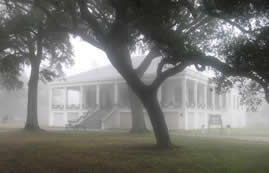
The Real Jefferson Davis
“Landon Knight concludes a series of articles in The Pilgrim (Battle Creek, Mich.) for March
of “the real” Jefferson Davis, in which he says:
“It is a difficult matter at this distance of time to realize the attitude of public sentiment
against Jefferson Davis, the state prisoner at Fortress Monroe. As the Chief Executive
of the late Confederacy, he was, in popular estimation, the incarnation, if not the proximate
cause, of all the sins of rebellion, but worse than all the administration which in feverish,
puerile haste had declared him an accessory to the assassination of Mr. Lincoln, and
upon that score had paid out of the public treasury $100,000 for his capture, could not,
or rather dared not, reverse its attitude and speak the truth.
The result was, of course, that the vast majority of the people at the North believed Mr. Davis to
be as guilty of murder as he was of treason. Andrew Johnson, within ninety days after he
had issued his ridiculously false proclamation, admitted it to be without foundation – a fact which
all along was fully realized by every member of the government who had personally known the accused.
Mr. Davis was constantly demanding that be given the speedy and impartial trial provided in
such cases by the Constitution. Charles O’Conner, then the greatest of living lawyers, Henry Ould,
and many other leading members of the bar from the Northern States, volunteered to defend
Mr. Davis . . . Horace Greeley, through the columns of the Tribune, constantly demanded that
Mr. Davis either be liberated or brought to trial, and by the spring of 1866 had created such a
sentiment in favor of his contentions that the government could no longer delay some action.
Accordingly in May an indictment was procured, charging Jefferson Davis with high treason against
the United States . . . [But] despite [this indictment] there were those who clearly foresaw the danger
involved in it, and hoping that time might dispose of the necessity for any trial
at all, urged delay as the wisest measure.
The [Richmond] courtroom was crowded to utmost capacity, and despite the stern discipline sought
to be enforced, it was with the greatest difficulty that the applause could be suppressed that from
time to time greeted the profound logic and masterly eloquence of Charles O’Conner’s great
speech on the motion to quash the indictment. The arguments lasted two days . . . [and] Mr. Davis
was soon afterwards admitted to bail, Horace Greeley, Gerritt Smith, Augustus Schell, and a
number of other former political enemies becoming his bondsmen.
Charles O’Conner’s bold declaration that Jefferson Davis could never be convicted of treason
under the Constitution as it then stood first aroused the [Andrew Johnson] administration to
the dangers of the task it had assumed. Mr. Johnson sent for his attorney-general [Stanberry]
and had him prepare an opinion on the case [which] was a veritable bombshell which fairly
demolished every theory upon which Jefferson Davis might have been convicted of treason
or any other crime.
Mr. Johnson then called to his aid two of the greatest constitutional lawyers of the age,
and they agreed to the conclusions of Mr. Stanberry.
Not satisfied with this, he invited the Chief Justice to a conference for a full discussion of
the matter. If there was ever a partisan, it was Salmon P. Chase, but at the same time
he was a great lawyer and an honest and fearless man. “Lincoln,” he said, “wanted [Jefferson]
Davis to escape. He was right. His capture was a mistake, and his trial will be a greater one.
We cannot convict him of treason. Secession is settled. Let it stay settled.”
Significant words truly from that source, and they explain the vote of that great judge who would
have quashed the indictment against Mr. Davis no less than the question so often asked:
“Why was Jefferson Davis never tried for treason?”
Immediately after Mr. Davis’s release on bond, he went with his family to New York, and a
few weeks later to Montreal, where he continued to reside until May of the following year, when
he again appeared before the Circuit Court in Richmond for trial. But despite the efforts of his counsel
to force a trial of the case, it was dismissed by the [Northern] government, and thus ended
ingloriously the boast . . . that it intended “in the arch-traitor Davis to make treason odious.”
The concluding paragraph of [The Rise and Fall of the Confederate Government], written in the gray
dawn of a summer morning after a night of continuous labor, should be read by everyone who
would understand the motives that actuated Jefferson Davis in the great part that he played in world history:
“In asserting the right of secession it has not been my wish to incite its exercise. I recognize
the fact that war showed it to be impractical, but this did not prove it to be wrong; and now that
it may not again attempted, and the Union may promoter the general welfare, it is needful that
the truth, the whole truth, should be known so that crimination and recrimination may forever cease,
and then on the basis of fraternity and faithful regard for the rights of the States there may be
written on the arch of the Union, “Esto perpetua.”
It is the voice of the soul in defeat, yet strong and conscious of its own integrity, recognizing the
inevitable and praying for peace and the perpetuation of that Union which Jefferson Davis still loved.
His life’s work was done with the completion of his book, and, trusting to impartial posterity for
that vindication of his motives which he realized must come some day, he turned away from the
scenes of controversy and contentions, seeking in books, the converse of his friends, in long
rambles with his children across wood and field, for oblivion of all painful memories.
Defeat and persecution never embittered him. Cruel and false accusations found their way to his sylvan
retreat. A harsh or unkind word never passed his lips concerning and of his personal or political enemies.
In fact, it would be no more than the truth to say that this gentle old man cherished no sentiment
of enmity toward any of God’s creatures.
The storm and stress of life were over, its hopes and its passions were dead, and grandly,
majestically this man, who at once embodied the highest type of American manhood
and all of the virtues of the perfect Christian gentleman, calmly awaited the end.
It came on the 6th of December, 1889, in New Orleans, at the home of Judge Fenner, his lifelong friend.
When the news of his death went forth, even the voice of malice was subdued, and many of those
who had sought to fix everlasting infamy upon his name ceased for a time to be unjust and agreed
that a majestic soul had passed. Over the bier of the dead chieftain the whole South wept,
and nine of its governors bore him to the grave.
Lest any foreigner should read this statement, let me say for his benefit that there are two
Jefferson Davises in American history. One is a conspirator, a rebel, a traitor, and “the Fiend of Andersonville” –
he is a myth evolved from the hell-smoke of cruel war, as purely as imaginary a personage as
Mephistopheles or the Hebrew devil; the other was a statesman with clean hands and a pure heart,
who served his people faithfully from budding manhood to hoary age, without thought of self,
with unbending integrity, and to the best of his great ability – he was a man of whom all
his countrymen who knew him personally, without distinction of creed political, are proud,
and proud that he was their countryman.
This is a conclusion by no means extravagant, a conclusion which, despite the fact of some
mental faults that prevented him from quite attaining the first rank of the greatest statesman,
nevertheless leaves him pre-eminent as one of the purest and best of the men who has
played a conspicuous part in the world’s history.”
(The Real Jefferson Davis, Confederate Veteran, April 1904, pp. 195-197)
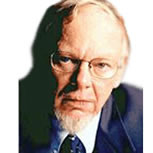
Analyzing the Myths
The War – My Myth or Yours?
A review of The Myth of the Lost Cause and Civil War History, by Gary Gallagher and Alan Nolan,
Indiana University Press, 2000. Clyde N. Wilson
“The Progressive historian Howard K. Beale (mentor of C. Vann Woodard) published in 1946 an
essay called “What Historians Have Said About the Causes of the Civil War.” He intended not so
much to comment on the Civil War as to present an exhibit of the patterns made by successive
changes in historical interpretations. Beale thought that the scholarship did, with the passage
of time and the accumulation of knowledge make progress, though slowly and unevenly, in
approaching the ultimate unreachable “truth” of history. However, the predominant pattern of
historical interpretations, Beale found in reviewing the literature on the Civil War, is not
progressive, but cyclical. Every “new” interpretation has its precedent in explanations made
at the time of the event by actual participants and commentators.
Historians offer not new interpretations but only new versions of old ones.
[Beale’s book] offers stunning proof of Beale’s prescience. The mainstream explanation of the
War which flourished from 1861 to about 1900, Beale wrote, was the “devil theory”: the war was caused
by a conspiracy of selfish or wicked men” against the Union. (Confederates had their own version of
the devil theory but it had little influence prior to 1900.)
Nolan’s essay, “The anatomy of the Myth,” and a complementary one by co-editor Gallagher, contain
nothing new except in the packaging. Their case is a militant re-assertion of the thesis that the war was
caused by the wickedness of Southerners, a case made by such works as Joshua R. Gidding’s History
of the Rebellion (1864) and Henry Wilson’s History of the Rise and Fall of the Slave Power in America
(3 vol., 1872-1877). Not since the War generation have the good guys and bad guys been
so starkly differentiated as by Nolan.
Nolan presents the world with what he considers to be an undisputedly accurate summation
of the War. Eleven seceding Southern States, under the domination of a small group of slaveholders,
attempted without justification to “destroy the United States” and initiated war by an unprovoked
attack on Fort Sumter. The “United States” rose up in righteousness and put down the evil
rebellion, in the process securing emancipation for African-Americans and generously refraining
from the severe punishments the traitors deserved.
“Having swept away the counterfactual Myth of the Lost Cause,” Nolan believes he has established
the true “historical image of the war” which is “undisputed as accurately describing the
central aspects” of the Civil War era.
But unfortunately, ala, according to Nolan, “despite the undisputed essentials, the War is today
surrounded by a vast mythology.” On the one hand there is the true history of the war, and on the other
hand there is the mythology of “the Lost Cause,” which seems to persist despite the agreement of all
good and informed persons that the “Lost Cause” is a “caricature of the truth” which
“wholly misrepresents and distorts the facts of the matter.”
The “Lost Cause,” presumably a belief that the Confederates had a few points on their side of the
argument, was something, according to Nolan and Gallagher, invented after the War by Southerners
to rationalize their evil, destructive and failed actions.
In support of this conclusion they present a history of the development of this false and pernicious
“Lost Cause Myth,” beginning with the postwar writings of Edward A. Pollard and Jubal A. Early. These
writings, the authors claim, foisted on an unsuspecting world false and deceptive notions such as the
admirable character of Robert E. Lee, the skill and heroism of Confederate soldiers against heavy
odds, and the honorableness of Southerners in their cause.
The editors are so clearly offended and alarmed by the power and persistence of the “myth” and long
to destroy it completely. The timing of their attack surely relates, as “new” historical interpretations
usually do, more to concerns of the present day than to the support of historical “truth.”
To accept Nolan’s “undisputed” interpretation one has to have the implicit belief that Northerners always
deal in true “facts,” that their motives are always good, and that the words of Southerners about their
own motives and actions are always untrue. Apparently, only Southerners among all
Americans suffer from self-flattering myths.
In a well-known essay, “History and Morality,” the great English historian Sir Herbert Butterfield said
that historians who are aware of and allow for their own prejudices are more reliable than those
who are convinced of their own objectivity. He also warned that what historians present as
moral judgments of acts and actors in the past are too often not really moral judgments
at all but merely preferences.
It all depends not on expert discovery of “fact” but on who you like or dislike. In other words, contra Nolan,
the historian should have better things to do than exhibit his own likes and dislikes.
Gallagher and Nolan mightily lament but seem to have no adequate explanation as to why the “Lost Cause”
shows so much vitality. A serious investigation might look into why the north (and the rest of the world)
has had such a voracious appetite for “Lost Cause” mythology. Is it possible that the myth owes much
of its creation to and force to Northern psychological needs instead of being just a Southern deception?
(Clyde N. Wilson, Defending Dixie, pp. 51-52)

Conservative historian M.E. Bradford was deeply concerned by the ongoing deification
and cult status of Lincoln, and how Yankee idolatry of him had so blurred the history, nature and
consequences of the war “as to render Lincoln impervious to serious criticism.”
Lincoln’s War to Prevent Self-Government
“As Frank Owlsey complained in 1946, there was afoot in this land, “what seems to me a Lincoln
cult bordering on pagan deification which is taking place in the popular mind of the North”;
and it has been seriously inspired by serious scholars, who have allowed their emotions
and bias to overemphasize certain elements and minimize others.”
In his essay on “A Southerner’s View of Abraham Lincoln,” Owsley’s principal complaint was
not that Lincoln lacked moral scruples, but that he frequently exercised poor judgment – as seen,
for example, in his refusal to accept the Crittenden Compromise and in his naïve, persistent
belief that the people of the South would never support their leaders in a war of secession.
Lincoln, argued Owsley, never fully grasped the depth of Southern patriotism or the magnitude of the
war, until it was too late to compromise. By denying the South the right to self-government, Lincoln
also subverted the democratic principles of the document he so often cited as authority for his
constitutional views – the Declaration of Independence. “It seems ironic to Southerners that the
United States,” observed Owsley, “a nation based upon the right of the people to live under a
government of their choice, should make war to prevent a people – the South –
from living under a government of their choice.”
No less charitable with respect to Lincoln’s motives and moral reasoning, Donald Davidson
also questioned Lincoln’s political acumen . . . asserting that the emancipator foolishly made war
on his own ideas and objectives, ruining both the South and the North while
creating an America he did not want.
[M.E.] Bradford persuasively demonstrated [that Lincoln] was more than simply wrong-headed;
he was “dishonest” and “duplicitous” “pseudo-Puritan,” a disingenuous “opportunist” guilty
of “calculated posturing,” “historical distortions,” and “high crime”; he was indeed
“the American Caesar of his age.”
“It is at our peril,” Bradford cautioned, “that we continue to reverence his name.”
(Walking the Levee with Mel Bradford, James McClellan; A Defender of Southern Conservatism, Wilson, editor, pp. 45-46)
![]()
The Pursuit of Southern History, George Brown Tindall, editor, LSU Press, 1964
Defending Dixie, Clyde N. Wilson, Foundation for American Education Press, 2006
Reconstruction: The Ending of the Civil War. Avery O. Craven, Holt, Rinehart & Winston, 1969
The Coming of the Civil War, Writing Southern History, Link & Patrick, editors, LSU Press, 1967
Lincoln and the Radicals, T. Harry Williams, University of Wisconsin Press, 1965
The Age of Hate, George Fort Milton, Coward-McCann, Inc., 1930
A Defender of Southern Conservatism, M.E. Bradford, Clyde N. Wilson, editor, University of Missouri Press, 1999
Glorious Contentment, The Grand Army of the Republic, Stuart McConnell, UNC Press, 1992
Black Jack Logan, Gary Ecelbarger, Lyons Press, 2005
Copyright 2012, the North Carolina War Between the States Sesquicentennial Commission